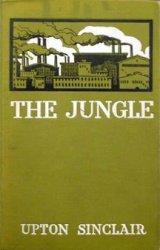The Jungle Page #34
The Jungle is a 1906 novel by the American journalist and novelist Upton Sinclair. Sinclair wrote the novel to portray the harsh conditions and exploited lives of immigrants in the United States in Chicago and similar industrialized cities.
There was another interesting set of statistics that a person might have gathered in Packingtown--those of the various afflictions of the workers. When Jurgis had first inspected the packing plants with Szedvilas, he had marveled while he listened to the tale of all the things that were made out of the carcasses of animals, and of all the lesser industries that were maintained there; now he found that each one of these lesser industries was a separate little inferno, in its way as horrible as the killing beds, the source and fountain of them all. The workers in each of them had their own peculiar diseases. And the wandering visitor might be skeptical about all the swindles, but he could not be skeptical about these, for the worker bore the evidence of them about on his own person--generally he had only to hold out his hand. There were the men in the pickle rooms, for instance, where old Antanas had gotten his death; scarce a one of these that had not some spot of horror on his person. Let a man so much as scrape his finger pushing a truck in the pickle rooms, and he might have a sore that would put him out of the world; all the joints in his fingers might be eaten by the acid, one by one. Of the butchers and floorsmen, the beef-boners and trimmers, and all those who used knives, you could scarcely find a person who had the use of his thumb; time and time again the base of it had been slashed, till it was a mere lump of flesh against which the man pressed the knife to hold it. The hands of these men would be criss-crossed with cuts, until you could no longer pretend to count them or to trace them. They would have no nails,--they had worn them off pulling hides; their knuckles were swollen so that their fingers spread out like a fan. There were men who worked in the cooking rooms, in the midst of steam and sickening odors, by artificial light; in these rooms the germs of tuberculosis might live for two years, but the supply was renewed every hour. There were the beef-luggers, who carried two-hundred-pound quarters into the refrigerator-cars; a fearful kind of work, that began at four o'clock in the morning, and that wore out the most powerful men in a few years. There were those who worked in the chilling rooms, and whose special disease was rheumatism; the time limit that a man could work in the chilling rooms was said to be five years. There were the wool-pluckers, whose hands went to pieces even sooner than the hands of the pickle men; for the pelts of the sheep had to be painted with acid to loosen the wool, and then the pluckers had to pull out this wool with their bare hands, till the acid had eaten their fingers off. There were those who made the tins for the canned meat; and their hands, too, were a maze of cuts, and each cut represented a chance for blood poisoning. Some worked at the stamping machines, and it was very seldom that one could work long there at the pace that was set, and not give out and forget himself and have a part of his hand chopped off. There were the “hoisters,” as they were called, whose task it was to press the lever which lifted the dead cattle off the floor. They ran along upon a rafter, peering down through the damp and the steam; and as old Durham's architects had not built the killing room for the convenience of the hoisters, at every few feet they would have to stoop under a beam, say four feet above the one they ran on; which got them into the habit of stooping, so that in a few years they would be walking like chimpanzees. Worst of any, however, were the fertilizer men, and those who served in the cooking rooms. These people could not be shown to the visitor,--for the odor of a fertilizer man would scare any ordinary visitor at a hundred yards, and as for the other men, who worked in tank rooms full of steam, and in some of which there were open vats near the level of the floor, their peculiar trouble was that they fell into the vats; and when they were fished out, there was never enough of them left to be worth exhibiting,--sometimes they would be overlooked for days, till all but the bones of them had gone out to the world as Durham's Pure Leaf Lard! Chapter 10 During the early part of the winter the family had had money enough to live and a little over to pay their debts with; but when the earnings of Jurgis fell from nine or ten dollars a week to five or six, there was no longer anything to spare. The winter went, and the spring came, and found them still living thus from hand to mouth, hanging on day by day, with literally not a month's wages between them and starvation. Marija was in despair, for there was still no word about the reopening of the canning factory, and her savings were almost entirely gone. She had had to give up all idea of marrying then; the family could not get along without her--though for that matter she was likely soon to become a burden even upon them, for when her money was all gone, they would have to pay back what they owed her in board. So Jurgis and Ona and Teta Elzbieta would hold anxious conferences until late at night, trying to figure how they could manage this too without starving. Such were the cruel terms upon which their life was possible, that they might never have nor expect a single instant's respite from worry, a single instant in which they were not haunted by the thought of money. They would no sooner escape, as by a miracle, from one difficulty, than a new one would come into view. In addition to all their physical hardships, there was thus a constant strain upon their minds; they were harried all day and nearly all night by worry and fear. This was in truth not living; it was scarcely even existing, and they felt that it was too little for the price they paid. They were willing to work all the time; and when people did their best, ought they not to be able to keep alive? There seemed never to be an end to the things they had to buy and to the unforeseen contingencies. Once their water pipes froze and burst; and when, in their ignorance, they thawed them out, they had a terrifying flood in their house. It happened while the men were away, and poor Elzbieta rushed out into the street screaming for help, for she did not even know whether the flood could be stopped, or whether they were ruined for life. It was nearly as bad as the latter, they found in the end, for the plumber charged them seventy-five cents an hour, and seventy-five cents for another man who had stood and watched him, and included all the time the two had been going and coming, and also a charge for all sorts of material and extras. And then again, when they went to pay their January's installment on the house, the agent terrified them by asking them if they had had the insurance attended to yet. In answer to their inquiry he showed them a clause in the deed which provided that they were to keep the house insured for one thousand dollars, as soon as the present policy ran out, which would happen in a few days. Poor Elzbieta, upon whom again fell the blow, demanded how much it would cost them. Seven dollars, the man said; and that night came Jurgis, grim and determined, requesting that the agent would be good enough to inform him, once for all, as to all the expenses they were liable for. The deed was signed now, he said, with sarcasm proper to the new way of life he had learned--the deed was signed, and so the agent had no longer anything to gain by keeping quiet. And Jurgis looked the fellow squarely in the eye, and so the fellow wasted no time in conventional protests, but read him the deed. They would have to renew the insurance every year; they would have to pay the taxes, about ten dollars a year; they would have to pay the water tax, about six dollars a year--(Jurgis silently resolved to shut off the hydrant). This, besides the interest and the monthly installments, would be all--unless by chance the city should happen to decide to put in a sewer or to lay a sidewalk. Yes, said the agent, they would have to have these, whether they wanted them or not, if the city said so. The sewer would cost them about twenty-two dollars, and the sidewalk fifteen if it were wood, twenty-five if it were cement.
Translation
Translate and read this book in other languages:
Select another language:
- - Select -
- 简体中文 (Chinese - Simplified)
- 繁體中文 (Chinese - Traditional)
- Español (Spanish)
- Esperanto (Esperanto)
- 日本語 (Japanese)
- Português (Portuguese)
- Deutsch (German)
- العربية (Arabic)
- Français (French)
- Русский (Russian)
- ಕನ್ನಡ (Kannada)
- 한국어 (Korean)
- עברית (Hebrew)
- Gaeilge (Irish)
- Українська (Ukrainian)
- اردو (Urdu)
- Magyar (Hungarian)
- मानक हिन्दी (Hindi)
- Indonesia (Indonesian)
- Italiano (Italian)
- தமிழ் (Tamil)
- Türkçe (Turkish)
- తెలుగు (Telugu)
- ภาษาไทย (Thai)
- Tiếng Việt (Vietnamese)
- Čeština (Czech)
- Polski (Polish)
- Bahasa Indonesia (Indonesian)
- Românește (Romanian)
- Nederlands (Dutch)
- Ελληνικά (Greek)
- Latinum (Latin)
- Svenska (Swedish)
- Dansk (Danish)
- Suomi (Finnish)
- فارسی (Persian)
- ייִדיש (Yiddish)
- հայերեն (Armenian)
- Norsk (Norwegian)
- English (English)
Citation
Use the citation below to add this book to your bibliography:
Style:MLAChicagoAPA
"The Jungle Books." Literature.com. STANDS4 LLC, 2025. Web. 10 Mar. 2025. <https://www.literature.com/book/the_jungle_272>.








Discuss this The Jungle book with the community:
Report Comment
We're doing our best to make sure our content is useful, accurate and safe.
If by any chance you spot an inappropriate comment while navigating through our website please use this form to let us know, and we'll take care of it shortly.
Attachment
You need to be logged in to favorite.
Log In